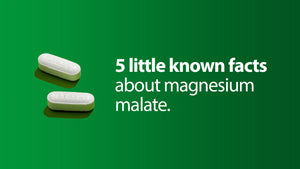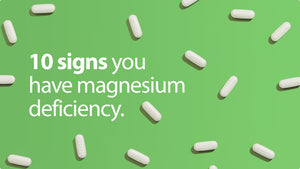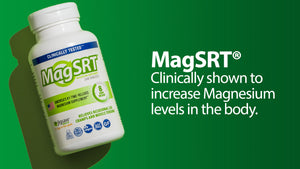Want Stronger Bones? You're going to need more than just Calcium...
Thomas DeLauer breaks down what minerals actually make your bones stronger, and the crucial role Magnesium plays in the latest #ScienceSaturday
Make sure you are meeting the RDI 400mg of Magnesium per day with Jigsaw's MagSRT® – America's #1 Time-Release Magnesium Supplement:

Transcript by Rev.com
- Honestly, there's a lot of nonsense out there when it comes down to calcium, when it comes down to bone density and bone health, and I quite frankly am sick of hearing it, so I wanted to address the fact that there are more important things to worry about when it comes to bone mineralization and when it comes down to bone health and bone density, than just the calcium that the dairy industry is constantly shoving down our throats.
Now, let me break some things down here, because it's really important that we understand.
When it comes down to actually taking up calcium into the bones, there are a lot of different things to come into play. Calcium is really just one part of it. Calcium is what is actually strengthening the bone, but there are so many other catalysts involved to either free up that calcium, or allow that calcium to transport into the bones so that it can start the positive process. So in this video, I'm gonna break down these other minerals. I'm talking about things like boron. I'm talking about things like silicone. I'm talking about things like Vitamin D, K2, but I'm also talking about the one and only magnesium, which may actually play a bigger part in calcium uptake into the bones than we're led to believe.
-Let's start with Vitamin D because it's one that a lot of people know about, and it's one that's big right now. Everyone's talking about it. The simple fact of the matter is, getting your Vitamin D from sunlight is always going to be the best bet. You can take a supplemental Vitamin D, but here's the thing. Some people have their opinions, and there's some science that's starting to show that taking Vitamin D3 could deplete your retinol levels. Now I'm not saying don't take a Vitamin D supplement, but what I am saying is making sure that you're modulating it. You see, what Vitamin D does is it helps corral the calcium and put it into the right places. That's why when you look on a carton of milk, a lot of times it will say calcium plus Vitamin D, because they do sort of works kind of harmoniously, but what we have to remember is that we don't wanna overdo it with anything. Getting it from sunlight, it's always gonna be the best.
However, there was one study that was published in 2005 in the Journal of American Medical Association that found that just taking 700-800 IU's of Vitamin D daily, did dramatically decrease the risk of hip fractures in postmenopausal women. Now, that's not the end all, be all. It doesn't mean everything, but it is just some science to explain to you.
-But now, let's talk about calcium for a second. Okay, calcium we're led to believe is the end all, be all. We are likely not deficient in calcium. Between dairy, between almonds, between salmon, between leafy greens, it is highly unlikely that you have a deficiency in calcium. In fact, if you were to actually get your blood work done, you would probably find you're not that deficient in calcium. We're quite frankly a little bit brainwashed to believe that we inherently have a deficiency in calcium, when in reality, calcium and magnesium work together, and magnesium plays a bigger role than we might think. You see, magnesium can actually help regulate the serum levels of calcium in the body. You see, magnesium actually regulates the calcium transport in the body.
In fact, there is a positive correlation between magnesium levels and calcium that's going into the bones. Yeah. Believe it or not, more magnesium equals more density in the bones. Now what we have to do, is we have to understand the relationship between calcium and magnesium, because in a lot of ways they're sort of the opposite, okay, whereas calcium excites a cell, magnesium encourages the relaxation of that cell. Then where calcium causes the blot to clot, magnesium generally helps keep blood flowing. The same kind of thing when it comes down to muscle contractions. Calcium is gonna increase the muscle's ability to contract, whereas magnesium is gonna allow that muscle to relax. It's not a good thing or a bad thing. We just have to remember that relationship and the yin and the yang in the balance put in calcium and magnesium. Here's the problem, most people in the western world are consuming three-and-a-half times as much calcium as they are magnesium.
-If you're looking at balance here, how does that equate?
This study was recorded in 1993 in the Journal of Magnesium Research, and what it did is it took a look at 31 postmenopausal women. These women, they compared to a controlled group. The 31 women they gave 125 milligrams of magnesium six times per day for two years. Then, the other group, they gave nothing. It was a controlled group. What they found, is at the end of two years, the group that took magnesium had significantly higher levels of bone density and good bone mineralization compared to placebo. So that simply shoes us that magnesium does play a role in bone density. It does play a role in how the calcium is taken up into the bone to actually make a bone harder and stronger, but there's a part two to this study, and this is actually looking at it a couple of years later. They found that those that were taking the magnesium, even after they stopped taking the magnesium, still retained their bone density significantly more than those that didn't take the magnesium.
So not only is magnesium good for getting bones stronger, it's good for keeping bones stronger quite permanently.
-Next up, we have to look at Vitamin K2, okay? Vitamin K2 and D3 sort of work together. It's the job of K2 to sort of be the traffic cop so to speak, and when I say that, it means that it shuttles the calcium into the right place. So without Vitamin K2, you have a lot of calcium floating around through the bloodstream, and it's never really getting into the bones. Now remember when I was talking about calcium and magnesium and how they oppose each other and how they kind of work together and that yin and yang? Well, imagine this. Imagine that K2 didn't exist, and it wasn't able to direct the calcium into the bones where it was supposed to go. So you just have this high amount of calcium floating around through the bloodstream. Well, that means you have a very excitatory process happening. You have a lot of cells that are being excited. You have a lot of muscles that are being contracted, and you're basically having this issue where you're never getting magnesium to counterbalance because you are always having an abundance of calcium.
So Vitamin K2 is critical for putting that in the right place. Now what this was also being done to show in some recent studies is actually free up more magnesium. Now the mechanism to how that's done really isn't known yet, but I can give you a strong hypothesis, at least as far as my opinion's concerned. When you have calcium and magnesium together, and suddenly the K2 is able to take the calcium and put it somewhere, you have less calcium opposing the magnesium, so magnesium is able to flourish and do its job. Therefore, you have more free magnesium in the body. Pretty simple in my opinion.
-Okay, now let's talk about silicone for a second. Most people freak out when they hear silicone, because they just think plastic, or rubber, or fake. The fact is that silicone is naturally occurring. If you consume enough silicone, you can actually increase the mineralization of bones. So basically, what that means is silicone initiates the process of calcium being able to do its job in the bone. So don't be afraid of silicone. You can get it in leafy greens, you can get it from the right vegetables.
A quick Google search will tell you the foods that are high in silicone. You likely don't need to take a supplement.
-Okay, now there's one other mineral that works in tandem with magnesium that I personally find very, very fascinating. That is boron. You see, boron is a relatively new mineral as far as science is concerned. They've been looking a lot into it in the last few years because there were some early studies that showed it had a really profound effect on testosterone levels. But when it comes down to magnesium and when it comes down to bone density, it's proven to be pretty darn powerful as well. You see, not only is boron able to help the kidneys retain magnesium, it's actually able to sustain the half-life of Vitamin D a lot better. So basically, it stabilizes Vitamin D in the body. If you have these big fluctuations of Vitamin D, which can happen over the course of weeks, that can cause some issues.
Okay, then you're having bones that are getting stronger because they're getting calcium, and then suddenly it's being ripped away. By contrast, that can be hard on the body. So if you extend the half-life of Vitamin D, it basically gets rid of the chances of you becoming Vitamin D deficient. We want our Vitamin D to go longer, and boron is going to be able to help you do that. But when it comes down to being able to retain more magnesium, we have to think about how the kidneys function for a second. The kidneys are gonna flush out minerals along with water. When we drink too much water, or when we don't drink enough water, our kidneys don't regulate right, and insulin plays a factor too, but our kidneys will actually dump a lot of the minerals, including precious magnesium that we need. So if the kidneys can retain magnesium, that means that our body's actually able to utilize magnesium better. Just plain and simple.
-So as always, with Jigsaw Health, make sure that you're getting the magnesium that you need. Make sure that you're getting the sustained-release magnesium that you need, especially when it comes down to making sure that you have healthy bones. So click on the link and check out Magnesium SRT by Jigsaw. You won't be disappointed. I'll see you in the next Science Saturday video.




















